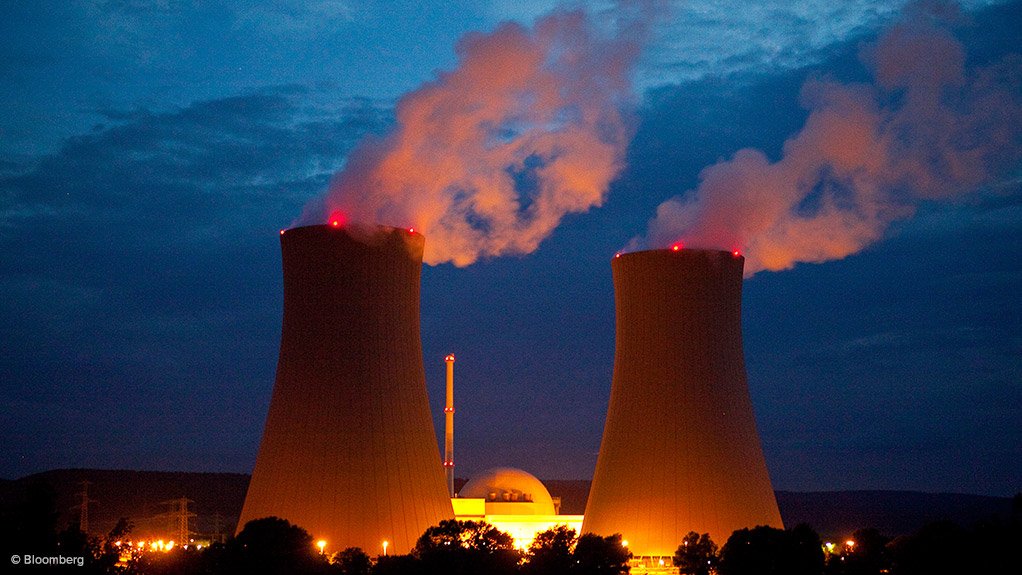There is a business case for nuclear in South Africa, says Necsa CEO
Government’s proposed 9.6 GW nuclear build programme has a place in South Africa, with new research showing that its base case cost could be lower than that of coal-fired power generation, South African Nuclear Energy Corporation (Necsa) CEO Phumzile Tshelane said on Friday.
He noted that the programme would cost less than the speculated R1-trillion to build, at less than $50-billion, or between R400-billion and R800-billion, within 20 years, and would produce positive returns to the economy.
The total project cost would not be completely dollar-based, particularly as, with 45% localisation, a large portion of the programme would be paid for in rands.
Further, the amount would not be forked out in one go but rather staggered.
While the procurement plan had not yet been finalised, with finance models still under consideration, government was planning to kick off the nuclear build programme in 2018, with the first of the ten reactors to be commissioned between 2023 and 2028, and the final one by 2040.
Presenting at a Necsa business discussion, in Rosebank, Tshelane cited an independent report by UK-based Trusted Sources, which showed that nuclear had a business case in South Africa, with the base and discount rate of nuclear power in South Africa comparing positively with that of coal-fired power.
The base case cost of nuclear power, which had been in the pipeline since 1998, was determined to be $86.88/MWh, compared with the coal-fired power generation base case of $99.79/MWh.
The “better case”, or discount rate, for nuclear was $68.21/MWh, compared with $82.07/MWh for coal, he said.
This translated into cost of capital of nuclear of between 7% and 10%, operational and maintenance costs of between $10.7/MWh and $14.5/MWh and fuel costs of $9.8/MWh to $10.8/MWh.
The study outlined that nuclear would also reduce carbon emissions by 21%, translating into a monetary value of $5-billion at $5/t, contributing positively to South Africa’s carbon reduction ambitions.
“It is an independent study that shows there is a business case,” he said, pointing out that, to be competitive globally, South Africa had to diversify its resources and “use what we have”.
Coal-fired power currently accounted for 80% of the country’s energy mix, while nuclear accounted for 5%.
“We must play to our own strengths,” he stressed.
The country had the capacity, citing the successful 50-year history of the Koeberg nuclear power plant, in Cape Town, and Necsa’s Safari-1 research reactor at Pelindaba.
However, South Africa was yet to release a formal request for proposals for the nuclear programme, with Tshelane saying that the procurement requests would be issued when ready.
The country aimed to securely embed its 45% localisation ambitions and ensure that the national programme contributed positively to social, economic and transformative growth and development.
“The cornerstone of the programme needs to be localisation,” he noted, adding that 45% localisation would generate some $77.3-billion in benefits for the economy.
South Africa had failed to fully localise skills and capacity despite building power stations every decade – barring the 1990s and 2000s – since the 1940s.
Tshelane said this would not be the case with the nuclear power build programme.
Intergovernmental agreements had been inked with China, France, Russia, the US and South Korea, which laid the foundation for cooperation, trade and the exchange of nuclear technology and procurement.
The areas of cooperation covered the entire scope of nuclear development, including nuclear power plant technology and construction, financing and commercial matters, multipurpose research reactor technology and construction, manufacturing, industrialisation and localisation, and human resources and skills development.
Comments
Press Office
Announcements
What's On
Subscribe to improve your user experience...
Option 1 (equivalent of R125 a month):
Receive a weekly copy of Creamer Media's Engineering News & Mining Weekly magazine
(print copy for those in South Africa and e-magazine for those outside of South Africa)
Receive daily email newsletters
Access to full search results
Access archive of magazine back copies
Access to Projects in Progress
Access to ONE Research Report of your choice in PDF format
Option 2 (equivalent of R375 a month):
All benefits from Option 1
PLUS
Access to Creamer Media's Research Channel Africa for ALL Research Reports, in PDF format, on various industrial and mining sectors
including Electricity; Water; Energy Transition; Hydrogen; Roads, Rail and Ports; Coal; Gold; Platinum; Battery Metals; etc.
Already a subscriber?
Forgotten your password?
Receive weekly copy of Creamer Media's Engineering News & Mining Weekly magazine (print copy for those in South Africa and e-magazine for those outside of South Africa)
➕
Recieve daily email newsletters
➕
Access to full search results
➕
Access archive of magazine back copies
➕
Access to Projects in Progress
➕
Access to ONE Research Report of your choice in PDF format
RESEARCH CHANNEL AFRICA
R4500 (equivalent of R375 a month)
SUBSCRIBEAll benefits from Option 1
➕
Access to Creamer Media's Research Channel Africa for ALL Research Reports on various industrial and mining sectors, in PDF format, including on:
Electricity
➕
Water
➕
Energy Transition
➕
Hydrogen
➕
Roads, Rail and Ports
➕
Coal
➕
Gold
➕
Platinum
➕
Battery Metals
➕
etc.
Receive all benefits from Option 1 or Option 2 delivered to numerous people at your company
➕
Multiple User names and Passwords for simultaneous log-ins
➕
Intranet integration access to all in your organisation




















